Thesaurus : Doctrine
Référence complète : Boy, , "Réflexion sur le "droit de la régulation". A propos du texte de Marie-Anne Frison-Roche", D., chron., 2001, p.3031 et s.
____
Thesaurus : Doctrine
► Référence complète : B. Frydman, "Comme l'IA transforme le droit et la justice", in Formes de l'intelligence, Collège de France, 16 octobre 2025
____
► Voir le colloque Formes de l'intelligence, dans lequel la conférence s'insère.
____
____
►Résumé par l'auteur : "Les techniques d’IA ont été introduites depuis longtemps dans le domaine du gouvernement et de la régulation, et se déploient désormais à grande vitesse dans toutes les branches du droit en transformant considérablement les outils et la logique de l’action administrative et judiciaire. Ce développement s’inscrit dans le projet formulé déjà par Leibniz au XVIIe siècle d’un droit mathématisé et calculable, mais recourt à des techniques, comme le profilage, qui trouvent leur source première dans l’usage normatif des probabilités au XIXe siècle. Leur déploiement à large échelle, souvent de manière prématurée et sans contrôle adéquat, met au défi les bases de l’État de droit, spécialement le contrôle des pouvoirs, la protection des droits et la motivation des décisions qui les affectent. En dépit de plusieurs catastrophes d’ampleur industrielle déjà causées par les erreurs qu’elles ont provoquées, ces innovations s’inscrivent dans un modèle de régulation qui est là pour durer et qui nécessite la mise en place de contre-feux et de garanties adaptées qui reposent également sur l’innovation technologique."
____
►Notes prises : Soulignant que la population est de plus en plus favorable à ce que les I.A. gouvernent et jugent à la place des êtres humains, l'orateur insiste sur le fait que le modèle auquel on se réfère est le modèle scientifique. Le gouvernement n'est plus adossé sur la légitimité politique mais sur la formalisation "scientifique". L'IA est le prolongement de cela et notamment Grotius demande un Droit laïc reposant sur la force de la Raison euclidienne reprise par le Droit à travers le syllogisme. Domat poursuit en mettant les lois dans leur "ordre naturel".
C'est surtout Leibniz qui revendique le caractère scientifiquement incontestable du droit et de son application, pouvant se passer de l'approximation des juges et des avocat. Cette conception est aujourd'hui reprise. L'analyse économique du droit, concevant celui-ci comme un mode de gestion de la société, reprend l'idée (Coase).
L'histoire de l'IA est construite de la même façon, tout d'abord en matière de "conforme / non-conforme", puis en profilage des personnages (pour détecter notamment les fraudes, avec des cas préoccupants d'erreurs). Or, on ne connait pas les critères de qualification utilisés par l'IA.
L'orateur proteste car l'IA connexionniste qui choisit la décision ne révéle pas la façon de choisir la décision. Or, c'est une autre IA qui motivera la décision. Et c'est encore une autre IA, agentique, qui mettra en oeuvre.
La Loi a interdit les décisions automatiques : loi 1978, RGPD (mais exceptions possibles et c'est de fait autorisé dans le privé et par des lois spécialtes cela est possible dans l'Etat si justifié), IA (exceptions pour le crédit social, IA à haut risque sont autorisés mais il faut des garanties).
________
Feb. 23, 2026
Conferences
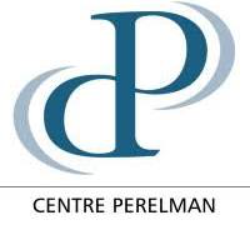
🌐Follow Marie-Anne Frison-Roche on LinkedIn
🌐Subscribe to the Newsletter MAFR Regulation, Compliance, Law
🌐Subscribe to the video newsletter MAFR Overhang
🌐Subscribe to the Newsletter MaFR Law & Art
____
► Full reference : M.-A. Frison-Roche, "The Future of Compliance", series Compliance, Centre Perelman, Brussels, 23 February 2026.
____
🧮view the full programme for the series Compliance (in French)
____
► English presentation of this concluding conference in the series Compliance : The future of Compliance: who knows what it holds? Anyone who practises and studies the texts, litigation, structures and behaviours will have to admit that they do not know what will become of what has emerged as a new branch of law. It is not easily recognised, probably for three reasons. Firstly, because the birth of a new branch of law is an unusual phenomenon, whose disruptive and regenerative waves are felt in all branches of law and other regulatory systems, accompanying and reflecting the new world we have already entered, whether we like it or not. Secondly, because it is unpleasant (especially if you are a professor...) to begin and conclude with the fact that you do not know. Thirdly, because it is not very marketable, and in today's large and growing "compliance market", it is not very smart, if you want to sell compliance products (whether they be algorithms, new services to be linked to the highest level of companies, specialities in law firms, new chairs in various schools), to say that you don't know. So the experts say they know. For my part, I meet many people who are "experts" and who are "knowledgeable". What is surprising is the diversity of their discourse, which casts doubt on the solidity of the projection, particularly on the meaning of words: for example, not only words that could be described as "new" (which we then try to anchor in old words) such as "compliance/conformity" and "governance", but also words that we are undoubtedly more familiar with, such as "commitment" and "responsibility" or "sanction", i.e. the very pillars of the matter.
Why is this a cause for concern, apart from the fact that it is always better to know what we are talking about, rather than everyone talking in their own corner, for their own compliance corpus, for their like-minded friends, with the subject matter becoming increasingly siloed? Because the object of Compliance Law is the future. So, the future of this branch of law which its object is the future is by nature very uncertain.
It will therefore be assumed in advance that not knowing the future is a major difficulty when it comes to Compliance Law, in that this branch of law is unified in that it is ex ante and its object is the future. The difficulty is neither of the same nature nor of the same magnitude when it comes to the legislator, the "regulator", the regulated company (calculating or political), or the judge faced with systemic compliance litigation.
That said, in a first part, one can imagine the future possibilities for Compliance (because that is what it boils down to, given the number of candidates eager to seize the instruments of power that are the " Compliance tools"). It is not a foregone conclusion that this future will be governed by Law. The consequences could take care of that. Or the order given by the leader (Trump, for instance), and that would go down all the better as he states that he certainly does not care about human beings but that he wields the power of Compliance to restore the climate balance (through Chinese regulations): except to say that there is no unified Compliance Law. That there would be one for the climate and another for human rights. So what about the future consistency of European Law, which links the two in the CSRD and the CS3D? Particularly in value chains. The question then is: what will be the uniqueness of Compliance Law in the future?
____
In a second part, since we do not know how things will turn out, from omnibus to omnibus, from a government hostile to the Law to a government appealing to the Due Process, from case law to case law, from special law to common law, we must weigh up the advantages and disadvantages of the various perspectives. There is never one perspective where everything is good and another where everything is bad, because in that case there would be no choice and no policy: it would be enough to have information, to be "rational" and to go for the right solution rather than the wrong one. Beyond general statements that a combination of compliance and ethics is welcome, which is not in doubt in the superb statements made in this regard, it is necessary to look at the advantages and disadvantages of the direction we may take. Firstly, there is the disappearance of Compliance Law, with the advantage of reducing the regulatory burden on those subject to it and the disadvantage of abandoning altruistic and global ambitions (these two Monumental Goals may overlap). Secundly, it could involve the creation of a global empire, with the advantage of a simplified American empire, whether extraterritorialised by the state or by companies and their governance or technology, with the advantage of a Western model and the disadvantage of the crushing of "mondialisation" by globalisation and the disappearance of the specific ambitions of States. Thirdly, it may be a contribution to a war between powers, particularly through the European DSA and the data war, with the advantage of European maturity in Compliance Law as an extension of Regulatory Law and the disadvantage that we could move from a war in the metaphorical sense (never use metaphors in Law) to a war. Quaterly, it could be a new rule of Law in which systemic companies participate in an alliance to achieve Monumental political Goals decided by States and political authorities, preserving systems for the future ("sustainability") so that human beings are not crushed by them but benefit from them. The disadvantage is that we have to relearn the Law, because although it has nothing to do with conformity, which is only an instrument, Compliance Law changes all branches of Law and requires the integration of other techniques, particularly political and technological ones.
____
In third part, in practice, we must strive in advance to reduce the disadvantages associated with the shortcomings of possible future developments in Compliance Law, just as we must strive in advance to increase the advantages associated with the qualities of possible future developments in Compliance Law. The disadvantage lies in the very nature of Compliance Law, namely its great power, because unlike Competition Law, it calls for and increases power. We must therefore counteract the prospect of compliance techniques, particularly those related to Information, being monopolised by those who only want to use them to consolidate or extend their power, laughing at Ethics and Monumental Goals. This means that supervision techniques on the one hand and a renewed role for judges on the other must be considered. The quality attached to possible futures stems from the fact that we could uphold a "Global Law" (reference to the work of Benoît Frydman, among others) and that, faced with the possible disappearance of Public International Law and the imperative preservation of value chains, particularly in the context of possible war, the alliance between supervised systemic companies and the political authorities in charge of the future of the social group that legitimises them may appear to be a legitimate, effective, efficiate and efficient system.
____
⛏️Go further :
🕴🏻M.-A. Frison-Roche, 📝Compliance Law, 2016
🕴🏻M.-A. Frison-Roche, 📝Conceiving Power, 2021
🕴🏻M.-A. Frison-Roche, 📕Compliance Monumental Goals, 2022
🕴🏻M.-A. Frison-Roche, 📝The Birth of a New Branch of Law: Compliance Law, 2024
🕴🏻M.-A. Frison-Roche, 📝Compliance Law and conformity: distinguishing between them to better articulate them, 2024
🕴🏻M.-A. Frison-Roche, 📕Complianceo Obligation, 2025
🕴🏻M.-A. Frison-Roche, 📝Compliance Law and Systemic Litigation, 2025
________
Feb. 22, 2026
Questions of Law
May 15, 2025
Publications
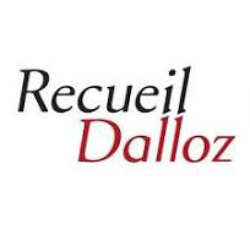
► Full Reference : M.A. Frison-Roche, Le "Grand Arrêt" de la Cour d'appel de Paris du 7 mai 2025, Dalloz et al. c/Forseti, D.2025, p.
____
📝reread the article (in French)
____
► Ench presentation of this article: The first part of the article describes the Paris Court of Appeal's ruling against the company that created a Legaltech platform under the trade name 'Doctrine', which offers a large number of court rulings, particularly from lower courts. Sued for unfair competition by a group of publishers offering a similar service, they were not convicted at first instance, but were convicted by the Court of Appeal because it appeared that they had fraudulently obtained thousands of judgments, which, under Civil Law, constitutes unfair competition to the detriment of the plaintiffs.
The second part of the article draws 6 lessons from this. The power of general law. On the benefits that the perpetrator has derived from the slowness of justice. On the importance of Open Data. On the fact that the law is not mastered by accumulating data but by putting it into perspective through the thinking of authors and publishers. On the indifference for this of the financiers who built and resold the "Doctrine" website. On the very nature of a 'Grand Arrêt', such as this one.
________
March 14, 2025
Thesaurus : Doctrine
► Référence complète : L. d'Avout, "Entre Luxembourg et Strasbourg, la fabrication médiatique du droit civil européen", Conférence à l'Université Toulouse-Capitole, 14 mars 2025.
► Présentation de la conférence par l'Université : cliquer ICI
____
🎥 Voir et Ecouter la conférence.
_________
Feb. 29, 2024
Thesaurus : Doctrine

► Full Reference: B. Fiorini, "Approche doctrinale de l’enquête interne et de l’enquête pénale privée" ("Doctrinal approach to internal investigations and private criminal investigations"), in M.-A. Frison-Roche & M. Boissavy (eds.), Compliance et droits de la défense. Enquête interne – CJIP – CRPC, Journal of Regulation & Compliance (JoRC) and Dalloz, coll. "Régulations & Compliance", 2024, pp. 63-68
____
📕read a general presentation of the book, Compliance et droits de la défense. Enquête interne – CJIP – CRPC, in which this article is published
____
► English Summary of the article (done by the Journal of Regulation & Compliance - JoRC): The author sets out the two profoundly distinct, even opposing, cultures of inquisitorial and adversarial repressive procedural systems. The former gives confidence and power to public officials to find the truth, while the latter gives confidence and power to the opposing parties in the dispute. Private investigations naturally develop in the second system and not in the first.
This second system of thought is rooted in the United States, which naturally welcomes internal investigations carried out by companies and associates procedural principles such as the rights of the defence, adversarial proceedings and the right to a lawyer. The first system, characteristic of Continental Law systems, is resistant to the very idea of a private criminal investigation. This is why, when the internal investigation mechanism develops within a company, the procedural mechanisms mentioned above are less naturally associated with it.
____
🦉This article is available in full text to those registered for Professor Marie-Anne Frison-Roche's courses
________

March 25, 2023
Publications

🌐 follow Marie-Anne Frison-Roche on LinkedIn
🌐subscribe to the Newsletter MAFR Regulation, Compliance, Law
🌐subscribe to the Video Newsletter MAFR Surplomb
____
 ► Full reference: M.A. Frison-Roche, Vigilance, a piece of the European puzzle, Working Paper, March 2023.
► Full reference: M.A. Frison-Roche, Vigilance, a piece of the European puzzle, Working Paper, March 2023.
____
🎤This Working Paper has been done as was made the conclusion of the colloquiul La société vigilante ("Vigilant Company") at the Aix-Marseille University on March 24, 2023 (conference given in French)
____
📝It is also the basis of the article that introduces a special issue on La société vigilante
____
► Summary of this Working Paper: The contributions form a contrasted whole. It should not be concluded that some of them are correct and others false: through the reading that each one makes of the so-called French 2017 "Vigilance law," it is a vision of the world as it should be that each author proposes. Because Compliance Law, which Vigilance is a part, claims to draw the future, it is normal that each author should draw the present Law with a hand that bends in one direction or the other, following their conception of the future world. The whole contributions must be seen as a dialogue.
A lively dialogue, with this French 2017 law receiving a lot of "glory" and a lot of "indignity" on both sides, from which it is necessary to emerge in order to find solutions, because it is a fundamental movement of which this law is only a gateway (I). Whatever one thinks of it, it is all the branches of law that are used, affected, and transformed by Vigilance (II). To master this profound transformation, we must turn to Europe, to the great puzzle of texts recently adopted or in the process of being adopted in the European Union, of which Vigilance is the hallmark (III).
____
🔓read the Working Paper⤵️
Feb. 2, 2023
Publications

► Full reference: M.-A. Frison-Roche, "Ajuster par la nature des choses le Droit processuel au Droit de la Compliance" ("Adjusting by the nature of things General Procedural Law to Compliance Law"), in M.-A. Frison-Roche (ed.), La juridictionnalisation de la Compliance, coll. "Régulations & Compliance", Journal of Regulation & Compliance (JoRC) and Dalloz, 2023, p. 251-262.
____
📝read the article (in French)
____
🚧read the bilingual Working Paper which is the basis of this article, with additional developments, technical references and hyperlinks
____
📕read a general presentation of the book, La juridictionnalisation de la Compliance, in which this article is published
____
► The principal elements of this articles had been presented during the scientific manifestation held on September 23, 2021, at Dauphine University in Paris, coorganised by the Journal of Regulation & Compliance (JoRC) and the Institute Droit Dauphine.
In the book this article is placed in the chapter II about the General Procedural Law in the Compliance Law.
____
► Summary of the article (done by the Journal of Regulation & Compliance): Procedural law is an invention, essentially due to professor Motulsky, going well beyond the gain that one always has in comparing types of procedures with each other. As he asserted, there is Natural Law in General Procedural Law, in that as soon as there is the Rule of Law Principle there cannot be, whatever the "procedure", even the "process" such and such way of doing things: for example, to decide, to seize the one who decides, to listen before deciding, to contest the one who has decided.
General Procedural Law therefore depends on the nature of things. However, Compliance Law organizes things in a new way. Therefore, both the simple and iron principles of General Procedural Law creep in where we do not expect them at first sight, because there is no judge, this character around whom ordinary procedures fit together. The principles of General Procedural Law are essential in companies. Even if the regulations do not breathe a word about it, it is up to the Judges, in particular the Supreme Courts, to recognize this nature of things because on this effect of nature that General Procedural Law is built: when compliance mechanisms oblige companies to strike, General Procedural law must oblige, even in the silence of the texts, to arm those who can be hit, even stand up against devices that would set aside too much these defenses that are easily considered contrary to efficiency (I).
But because it is a question of making room for this nature of the things of which the Rule of Law Principle entrusts the custody to the Judge and the Lawyer, the General Procedural Law must also adjust itself to what the extraordinary new branch of Law Compliance Law is. Indeed, Compliance Law is extraordinary in that it expresses the political pretention to act now so that the future will not be catastrophic, by detecting and preventing the realization of systemic risks, or even that it is better, by building effective equality or real concern for others. Because it is the Monumental Goals that defines this new branch of Law, a disputed systemic issue, possibly disputed by several parties before a judge, the procedural principles used by the court must be broadened considerably: they must then include civil society and the future (II).
General Procedural Law thus naturally acquires an even more place than in the classic branches of Law since on the one hand it imposes itself outside of trials, particularly in companies and on the other before the courts it involves people who had hardly any place to speak and thinks themselves, especially the systems entering the "causes" of Compliance now debated before the Judge.
________

Nov. 12, 2022
Publications


♾️ suivre Marie-Anne Frison-Roche sur LinkedIn
♾️ s'abonner à la Newsletter MAFR Regulation, Compliance, Law
____
► Référence complète : M.-A. Frison-Roche, Automated Compliance, a pertinent tool for Compliance Law, the whole, document de travail, novembre 2022.
____
📝Ce document de travail sert de base à une participation à un débat sur "Automated Compliance : "the" solution or "a" solution?, qui déroule dans le Sommet global de Gaia-X le 17 novembre 2022.
____
►Résumé du document de travail : s'appuyant sur la présentation préalablement faite au débat par un membre de la Commission européenne, il s'agit de souligner trois éléments qui montrent que l' Automated Compliance (ou Compliance by design) est à la fois un outil central, mais qu'il n'est un outil du Droit de la Compliance dont il ne saurait remplir par sa seule performance technologique toutes les fonctions dans un Etat de Droit.
En premier lieu, l'Union européenne semble en difficulté lorsqu'elle veut tout à la fois bâtir un système juridique qui lui est propre sur la base de Lois dont chacune est la pièce d'un gigantesque puzzle pour obtenir une industrie pérenne et autonome dans une économie numérique mondiale totalement renouvelée, ce qui fait peser sur les entreprises une charge considérable d'intégration de toutes ces règles du jeu, tout en affirmant qu'il faut alléger la charge que la "réglementation" fait peser sur elles.
En second lieu, la meilleure solution pour résoudre cette ambition contradictoire est effectivement dans la technologique, les algorithmes intégrant directement les réglementations. Mais plus encore, l'ensemble de ces textes reposent sur une autonomie laissée en Ex Ante aux entreprises européennes pour s'organiser entre elles afin de concrétiser les "buts monumentaux" que l'Union européenne a décidé d'atteindre, dont la réalisation d'un cloud souverain est au centre.
Ainsi la distinction et l'articulation d'un "Droit de la Compliance", défini par ces "buts monumentaux", dont lequel l'intelligence artificielle est un outil, le "tout" (Compliance Law) et la "partie" (Automated Compliance) est essentielle.
En troisième lieu, cette distinction et articulation est non seulement bénéfice mais elle est obligatoire. En effet, même si le Droit de la Compliance constitue une branche du Droit, elle fonctionne dans le système juridique générale, qui ne fonctionne que par l'esprit des textes, les outils algorithmiques ne capturant que la lettre de ceux-ci. Ces tribunaux sont et seront au cœur du Droit de la Compliance, le cas Schrems l'a bien montré. C'est pourquoi la Technologie et le Droit doivent travailler ensemble, et davantage à l'avenir, notamment parce qu'un outil pour l'effectivité du Droit ne pourra jamais rendre compte de la vie même du système juridique.
________
🔓Lire ci-dessous les développements⤵️

Dec. 24, 2021
Publications

🌐 follow Marie-Anne Frison-Roche on LinkedIn
🌐subscribe to the Newsletter MAFR Regulation, Compliance, Law
____
 ► Full reference: M.-A. Frison-Roche, Conceiving Power, Working Paper, December 2021
► Full reference: M.-A. Frison-Roche, Conceiving Power, Working Paper, December 2021
____
📝 This Working Paper serves as the basis for an article to be published in the collective book drawn up in tribute to Professor Emmanuel Gaillard.
____
► Working Paper summary: In 1985, Emmanuel Gaillard's central work came out under the title Le pouvoir en droit privé (The Power in Private Law)📎
Let's give full force to the original title of the thesis.
The deletion of the term notion perhaps implies that by defining something the essential is done, that there would be something of a pleonasm in aiming at The notion of Power and The Power, as Law likes to economise on words.
But it was indeed a renewed, simpler and more powerful conception of the notion of Power, containing the entire regime necessarily imputed, that this work imposed, henceforth illuminating positive Law. Emmanuel Gaillard's definition, on the other hand, goes beyond Private Law. We would gladly have argued in favour of retaining the heading for the term Notion, proposing instead to dispense with the reference to Private Law alone ....
Perhaps it was because the concept is so vast that in this seminal thesis its scope was restricted to Private Law, since the author already had to account for the sheer multiplicity of manifestations in this part of the legal system; Or perhaps it was because the concept of 'Power' is so familiar in Public Law that it would have needed less definition in Public Law (which, moreover, is so diversely proposed in this more political area, which is already careful on principle to distinguish between powers, which must always be plural in order to be separated), and that it was therefore reasonable to want to arrive at a single concept of Power in Private Law, where the notion of subjective rights is more familiar.
However, Emmanuel Gaillard's definition of Power as a prerogative placed, by legal rule or contract, in the hands of the person invested with them for the benefit, at least in part, of others, covers both Public and Private Law. This even contributes to the solidity of this thesis and explains why it flourishes today in legal systems where the distinction between Private Law and Public Law is weakening.
The power of this definition lies in its simplicity. Simple and brave minds are often the most fruitful. As Dean Gérard Cornu points out in his preface, the author, in particular because he bases himself more on positive law, for example that relating to the powers of corporate officers, does not get bogged down in discussions between authors only to end up preferring one over the other. He arrives at a definition that is close to our everyday experience: the one we experience when we collect an envelope on behalf of someone else and the agent asks us in what capacity we claim to be doing this on his behalf. We then show him our 'power', the legal power to do so for the benefit of the person to whom the letter is addressed, and can thus exercise the power to withdraw the letter, even though it is personal. When legal and common sense come together, it is a good omen, not only in terms of form, because everyone can understand it and the Law must remain comprehensible, but also in terms of substance, because everyone must be able to control the exercise of a power that is exercised for and over others. For this letter addressed to someone else, the person who has been able to take it by virtue of the power conferred on him/her, could just as easily open it and read it, then destroy it or give it to the worst enemy of the person to whom it was addressed. In Power, there is always might to do, and the danger to others that Power contains therefore.
This highly legal definition of Power not only distances the holder from his/her own interests, but also channels the Power thus granted to the person who benefits from it. In this respect, Emmanuel Gaillard not only distinguished between Power and subjective right, but also identified the right amount of power required for this power to effectively fulfill this 'Mission', through the notion of abuse of power, when the holder uses for other beneficiaries this power that was conferred on him/her for this sole purpose.
What is more, this concept makes it possible to distinguish Power from discretionary force, because the holder of Power thereby exercises factual , by acting for others, deciding for others, deciding on others. Because Power is inseparable from might, but might must remain the means of power and no more, the Law shall produce the antibodies that are not only the theory of abuse of power but also an Ex Ante responsibility that accounts must always be rendered, either to the other for whom everything is done or to a third party. For this third party is often there from the outset, the guardianship judge for example: because the Power was put in place because of the beneficiary's weakness, both in himself/herself and because of the situation, an impartial and disinterested third party is needed to ensure proper execution from the outset, without there even being a dispute. In this respect, how useful this thesis is for thinking about what Supervision is today!
This thesis, so clear, so simple and so strong, goes beyond Private or Civil Law. It is both much more restrictive than the more factual and political definition of Oower, which would be the ability to do something, and much broader than the usual definitions, since it embraces and legitimises de jure all situations where a person acts legally for the benefit of another. Dean Cornu shows, moreover, in two sentences that such a notion of power also captures the office of the judge, who has power over others only to serve them 📎
Moreover, Power thus contains its own limit in its very definition, since others are present in it: the holder has power only to serve others. From then on, it is only a power because it is a kind of Charge. Emmanuel Gaillard immediately uses the term: "Un individu se voit confier une charge qu'il exerce dans un intérêt au moins partiellement distinct du sien propre" ("An individual is entrusted with an office which he exercises in an interest at least partially distinct from his own") 📎
This definition offered by Emmanuel Gaillard in 1981, anchored in Private Law only insofar as it is the entire legal system, is premonitory of the Regulatory and Compliance Law as it unfolds today. It would be enough to continue the Gaillard's sentences, as if they had been half-written, to finish them 40 years later and find in them the mechanisms of Supervision of companies by public authorities which are now in place not to reduce their power but to ensure that they exercise it for the benefit of others 📎
The definition of Power thus conceived contains within itself its regime and enables us to anticipate it better today: because the holder exercises Power only for others, at least partially, he is consubstantially accountable for it, responsibility being only one form of this accountability; because this service must be effective and others must benefit fully from it, because unlike the subjective right which allows the holder freely not to use his might, Power has never been the 'most absolute' availability to use his/her might: it is even the opposite. It is the expression of a Power assigned to a purpose, compelling the holder to use his/her Power to that end. But it is equally necessary for the holder to have all the might to do so, otherwise the very notion of 'Power' is meaningless. This is the definition that should be given to the principle of Proportionality: the person on whom the Power rests must have not more power than is necessary, but all the power necessary to achieve the Monumental Goals for which the Power has been entrusted to him/her, so that others may derive full benefit from it (II).
In today's positive Law, the definition of Power as a Duty is found not only in Private Law but also in Public Law, not least because pure might, i.e. those that do not account for the use of their might, are in decline while concern for others is on the increase. The days of discretionary powers are over, and the increased independence of those who exercise Power over others requires them to be accountable. Beyond this Accountability, the personal Responsibility of those who have the Power to serve others is being established. But, no doubt because the Law is slow to evolve, the correlative idea that the holder of Power must have all the powers required to carry out his/her mission is less entrenched: As Emmanuel Gaillard has shown, the Law has only gone part of the way in sanctioning excesses of power, when the holder uses his/her power for other goals, but it has not yet clearly established that the holder - sometimes forced - of a Power is legitimate in using all the means required to achieve the result for which this Power, i.e. a charge and a duty, has been conferred on him/her.
No doubt we need to read Emmanuel Gaillard's thesis again in all its potential, to imagine the reading we could do today of what he could have written as if on blank pages that would write themselves, a magical thesis where everything is already there, a thesis so short (250 pages) and so beautiful, so dense that it already contains the Law of the Future. The Law of the Future 📎
____
Lire les développement ci-dessous⤵
Gaillard, E., Le pouvoir en droit privé, préf. Cornu. G., coll. ..., Economica, 1985.
Gaillard, E., La notion de pouvoir en droit privé, thèse .... ;
"En droit processuel, l'office du juge aurait donné à l'auteur un renfort. Pour le juge, il n'est point de pouvoir sans devoir. Au-delà de la distinction de ce qu'il a obligation de faire ou faculté d'apprécier, il y a toujours, au creux de ce qu'il peut, le sceau de ce qu'il doit, un devoir gardien - comme un âme - de l'exercice du pouvoir." (p.5).
n°3, p.9.
🕴️J. Carbonnier, 📗Essai sur les lois, 1992 (on the guardianship).
S. in a general way, 🕴️M.-A. Frison-Roche (ed.), 📕Régulation, Supervision, Compliance, 2017.
Cornu, préface précitée : "Tous les pouvoirs sont, à double face, des pouvoirs-devoirs" (p.5).
On Compliance Law as a Law of the Future, s. 🕴️M.-A. Frison-Roche, 📝Compliance Monumental Goals, beating heart of Compliance Law, in 🕴️M.-A. Frison-Roche (ed.), 📘Compliance Monumental Goals, 2023.
On the consequences for Liability Law, which is now looking to the Future, s. 🕴️M.-A. Frison-Roche, 🚧Ex Ante Responsibility, 2021.
Sur la notion de "Responsabilité Ex Ante", v. Frison-Roche, M.-A., La responsabilité Ex Ante", in Archives de Philosophie du Droit, La responsabilité, 2022.
Aug. 24, 2020
Newsletter MAFR - Law, Compliance, Regulation

Full reference: Frison-Roche, M.-A., The control by regulator of the essential infrastructure manager's investment plan: example of electric network and the notion of "doctrine", Newsletter MAFR - Law, Compliance, Regulation, 24th of August 2020
Read by freely subscribing other news of the Newsletter MAFR - Law, Compliance, Regulation
Summary of the news
On 31st of July 2020, the Commission de Régulation de l'Energie (CRE and French energy regulator) has examined the investment plan of the French electric network manager (RTE) as it does every year. This investment plan is an economic document but it also contains societal purposes, especially the adaptation of the electric network in order to integrate renewable energies.
The control by the CRE is not a financial control. The crucial operator (RTE) is free to decide the way it wants to manage its budget. The CRE just advices on the financial side by recommending for exemple to be more flexible in its financial strategies. The true CRE's control is about the investment plan's general orientations, the methodology of needs analysis and crucial operator's investment choices which must be aligned with those of the regulator.
Such a control leads to the emergence of an "investment doctrine" from the side of the crucial operator, mixing its own choices and the regulator's guidelines. Beyond this, the elaboration of the investment plan is the result of a true co-writing between the regulator and the firm which discuss together, exchanges points of view and methods. Such a method, expressing a kind of coregulation, could be used in other sectors.
July 3, 2018
Thesaurus : Doctrine
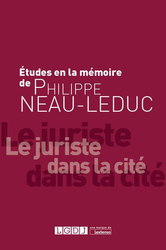
► Référence complète : Caron, Ch, Le juriste "auteur" dans la cité, in Études en l'honneur de Philippe Neau-Leduc, Le juriste dans la cité, coll. « Les mélanges », LGDJ- Lextenso, 2018, pp.207-213.
____
📕Lire une présentation générale de l'ouvrage dans lequel l'article est publié.
April 4, 2018
Thesaurus : Doctrine
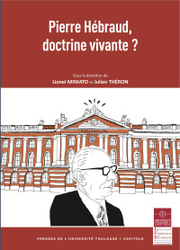
► Référence complète : E. Jeuland, "Hébraud, la notion de droit processuel dans la perspective de justice numérique, in L. Miniato et J. Théron (dir.), Pierre Hébraud, doctrine vivante ?, Presses Universitaires de Toulouse - LGDJ, 2018, pp. 25-37.
____
►lire la présentation du livre dans lequel cet article est publié : 📗Pierre Hébraud, doctrine vivante ?
____
____
April 4, 2018
Thesaurus : Doctrine

► Référence complète : L. Miniato et J. Théron (dir.), Pierre Hébraud, doctrine vivante ?, Presses Universitaires de Toulouse - LGDJ, 2018, 231 p.
____
____
► Présentation de l'ouvrage (faite par l'éditeur) : "Cet ouvrage consacré à Pierre Hébraud se propose d’étudier sa doctrine, lui qui fut notamment un éminent processualiste. L’occasion en est donnée avec les 80 ans de sa nomination comme professeur à Toulouse (1937) et les 30 ans de l’inauguration de l’amphithéâtre à son nom (1987). Pourtant, mais peut-être cela résulte-t-il de sa personnalité décrite comme discrète, son œuvre ne reste connue que des spécialistes, sans que jamais ne fût posée la question de déterminer s’il existe une doctrine propre à Pierre Hébraud, sans jamais que ne fût clamée une école de Pierre Hébraud. La doctrine de Pierre Hébraud, créatrice sinon révélatrice, a influencé la doctrine dans son ensemble et le droit positif sur un grand nombre de points : autorité de chose jugée, acte juridictionnel, classification des actions, rôle de la Cour de cassation, arbitrage… Juriste extrêmement ouvert, attiré par le droit comparé, il est même suspecté être à l’origine de la notion de droit processuel. Analyser les travaux de Hébraud en droit processuel et procédure civile nécessite évidemment de replacer ses écrits dans leur contexte. Mais il s’agit également et surtout de souligner qu’ils sont marqués d’une grande modernité et sont parfaitement aptes à décrire le droit contemporain et peut être même à régler des scories jusqu’ici irrésolues. La question posée au long de cette journée d’échanges est alors simple : sa doctrine est-elle toujours vivante ?".
____
► Sommaire de l'ouvrage :
Julien Théron, Avant-propos
Jean-Christophe Gaven, Pierre Hébraud, l’itinéraire universitaire
Première partie : La matière procédurale dans la doctrine de Pierre Hébraud
Chapitre 1 : Aspects fondamentaux
Emmanuel Jeuland, Hébraud, la notion de droit processuel dans la perspective de la justice numérique
Lycette Corbion-Condé, Pierre Hébraud et le droit international privé : une doctrine vivante ?
Chapitre 2 : Procédures spéciales
Thomas Clay, Pierre Hébraud et l’arbitrage
Olivier Staes, La juridiction du provisoire
Didier Cholet, Pierre Hébraud et la réforme de la Cour de cassation
Deuxième partie : Le juridictionnel dans la doctrine de Pierre Hébraud
Chapitre 1 : Le litige
Nicolas Cayrol, La liaison du contentieux
Lionel Miniato, La fonction juridictionnelle
Chapitre 2 : La portée
Philippe Théry, Pierre Hébraud : une analyse réaliste de la jurisprudence
Observations conclusives
Loïc Cadiet, Pierre Hébraud, doctrine vivante ?
May 17, 2017
Thesaurus : Doctrine
Référence : Champaud, Cl., Source et nature épistémologique de la Doctrine de l'entreprise, in Mélanges Joël Monéger, Liber Amicorum en l'honneur du Professeur Joël Monéger, LexisNexis, 2017, pp. 57-88.
May 17, 2017
Thesaurus : Doctrine
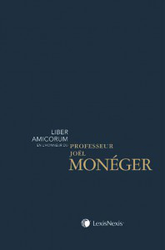
► Référence complète : Mélanges Joël Monéger, Liber Amicorum en l'honneur du Professeur Joël Monéger, LexisNexis, 2017, 818 p.
____
📝Lire la quatrième de couverture.
____
► Lire la présentation des articles publiés dans ces Mélanges :
🕴️Champaud, Cl.,📝 Source et nature épistémologique de la Doctrine de l'entreprise.
🕴️Dion, N., 📝L'idée d'entreprise-système en droit des sociétés.
🕴️Fox, E., 📝The new world order.
🕴️Nihoul,P., 📝Concurrence et démocratie.
🕴️Palmer, V., 📝Empires as engines of mixed legal systems
____
🗒️Les étudiants inscrits au cours de Marie-Anne Frison-Roche peuvent accéder au texte de ces articles.
________
Oct. 14, 2014
Thesaurus : Doctrine
Références complètes : Canivet, G., Prolégomènes à l'étude de la doctrine du Conseil constitutionnel en matière de concurrence, in BEHAR-TOUCHARS, Martine, CHARBIT, Nicolas et AMARO, Rafael (dir.), À quoi sert la concurrence ?, Paris, oct. 2014, p.423-428.
Les étudiants de Sciences po peuvent avoir accéder au texte de l'article via le drive de Sciences po, dossier "MAFR - Régulation".
Aug. 7, 2014
Blog
 The regulatory authority of the North American telecommunications (Federal Communications Commission - FCC) adopted a position 5 August 2014 to admit that the service providers charge users for the service of priority access to content. For some commentators, allowing this monetization, the FCC has "killed" the "net neutrality".
The regulatory authority of the North American telecommunications (Federal Communications Commission - FCC) adopted a position 5 August 2014 to admit that the service providers charge users for the service of priority access to content. For some commentators, allowing this monetization, the FCC has "killed" the "net neutrality".Immediately, President Barack Obama is strongly opposed to this position on behalf of the principle known as "net neutrality."
The Washington Post, in its presentation of this reaction of the President, described it as "populist".
Basically, it comes to choosing whether you prefer to favor companies that produce content and containing or to favor search engines. It is true that the search engines, whose business model relies heavily on the legal principle of "net neutrality" are American firms, like Google. On the other hand, many companies that carry the content and can therefore monetize the service of access to a priority basis are divided to more evenly around the world, including being located in Europe.
Updated: July 31, 2013 (Initial publication: Oct. 4, 2011)
Teachings : Les Grandes Questions du Droit, semestre d'automne 2011

Updated: July 31, 2013 (Initial publication: Sept. 13, 2011)
Teachings : Les Grandes Questions du Droit, semestre d'automne 2011

May 1, 2012
Thesaurus : Doctrine

May 27, 2005
Thesaurus : Doctrine
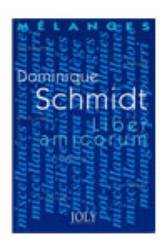
Référence générale : Dominique Schmidt, liber amicorum, Joly éd., 2005, 513 p.
Lire la table des contributions.
Lire la présentation de l'article de Marie-Anne Frison-Roche publié dans cet ouvrage : Régulation et droit des sociétés
July 5, 1995
Publications
Recherches menées et rapport général rédigée pour le Laboratoire de sociologie juridique, remis au Ministère de la Justice, juillet 1995.
June 24, 1992
Thesaurus : Doctrine
► Référence complète : B. Oppetit, Le droit international privé, droit savant, recueil des cours de l'Académie de Droit international de La Haye, vol. 234, 1992.
_____